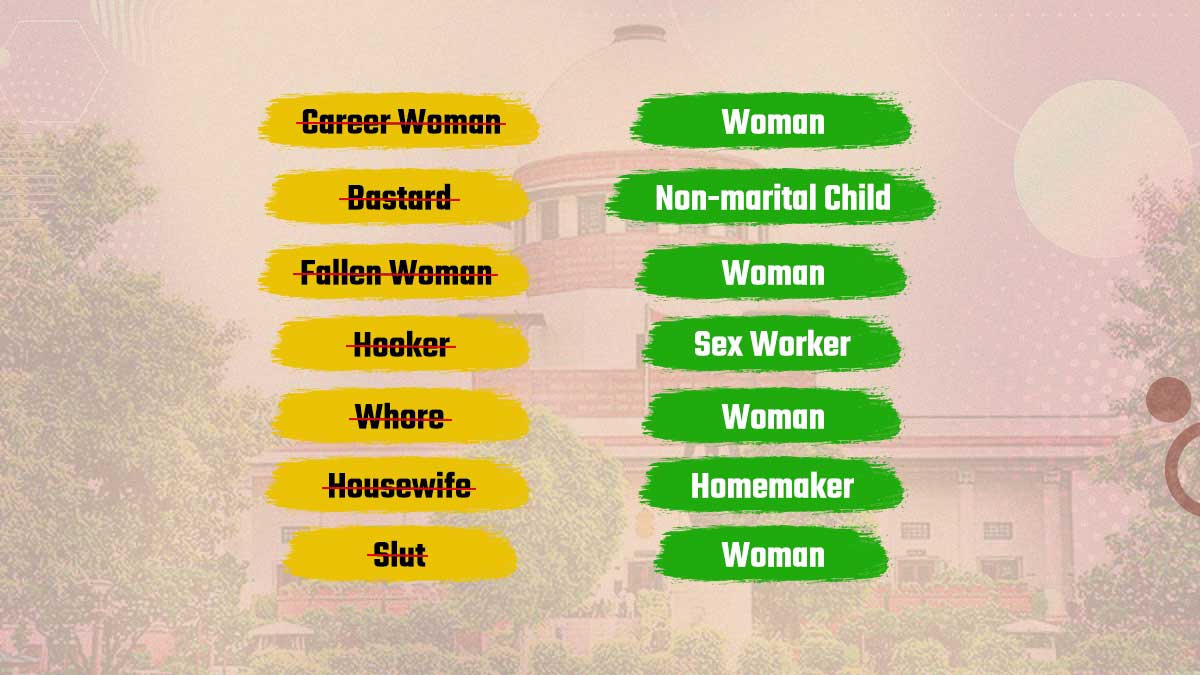
Language plays a crucial role in our everyday life. It is not just how we structure our sentences but also the words we use to refer to someone. How many times have we used words like slut, mistress, housewife, bastard, whore, forcible rape, transsexual, etc. or have seen these words being used on television and even in court? What do people even mean when they use terms like ladylike or hormonal?
Not only the words are demeaning, but they promote gender stereotypes. The Supreme Court of India prohibited the use of such words on August 16, 2023, when it introduced a handbook combating gender stereotypes.
“Language is critical to the life of the law. Words are the vehicle through which the values of the law are communicated. Words transmit the ultimate intention of the lawmaker or the judge to the nation,” read a statement in the handbook.
The SC's handbook also highlighted the fact that the language a judge uses reflects on the interpretation of the law and their perception of society.

Image Courtesy: Supreme Court Of India (https://main.sci.gov.in/)
In many cases, we refer to women and people from the LGBTQIA+ community with demeaning labels. Words like career woman, chaste woman, easy virtue, fallen woman, harlot, Indian or Western woman, seductress, slut, whore, or woman with loose morals will now be referred to as a woman.
There is no term like ‘forcible rape’. The SC asked people to refer it rape. ‘Bastard’ was often used as a curse word. Now, lawyers will use a non-marital child or a child whose parents were not married. Referring to people from the queer community, you cannot use biological sex, biological male, or biological female. You will use the sex assigned at birth. Similarly, preferred terms for hermaphrodite, sex change, transsexual, transvestite will be intersex, sex reassignment or gender transition, transgender, and cross-dresser.

Image Courtesy: Supreme Court Of India (https://main.sci.gov.in/)
We spoke to Shikhani Shah Engineer, Criminal Lawyer, Bombay High Court, about how the handbook will quash gender biases and stereotypes. She said, “I feel it is a good initiative since it can protect many people’s respect. A few words do affect a person.”
View this post on Instagram
She added, “Prostitute is not a word that anyone would like to hear.” She said that the handbook will be good for everyone. “It will give the right to each person to live a dignified life,” Shah said.
When you use the term ‘sex worker’, it adds dignity to hundreds of lives. Similarly, we do not say working man but say 'working woman' in a demeaning manner because subconsciously we are trying to say that she would not be able to take care of her home, kids, and family like a homemaker, initially referred to as a housewife, does.
Not only these words were demeaning but also biased towards one gender. It was only a woman who was called a mistress. Married men involved with them were equally a part of the relationship. They stripped a few sections of our society from the fundamental right to life and dignity. On multiple occasions, women were reprimanded by Indian courts and politicians for their allegedly labelled ‘provocative clothing’.
Survivors and victims of rape and sexual harassment have been blamed for the heinous crime because of the way they dressed. Discarding the derogatory term, the Supreme Court of India has officially asked the lawyers to address it as clothing or dress.
Don't Miss: 7 Rights Unmarried Couples In India Must Know About
The handbook mentioned that stereotypes often reside in our subconscious mind. Therefore, people rely on those stereotypes when they are having a conversation with other people. It often affects our actions, impacts the way we think about people, and prevents us from viewing the individual standing before us with unique talents and qualities.
It started an example that people from privileged castes have about individuals from underprivileged castes. They think that a person identifying with an oppressed caste cannot be as accomplished in school or university, when compared to people from the oppressor castes.
Speaking about the impact of stereotypes on judicial decision-making, the handbook mentioned that it can affect the intellectual rigour and the impartiality of decisions. It can cause a judge to ignore or bypass the requirements of the law.
“Even when judges reach legally correct outcomes, the use of reasoning or the language that promotes gender stereotypes undermines the unique characteristics, autonomy, and dignity of the individuals before the court,” read a statement in the handbook.
Don't Miss: Bombay HC Says A Single, Working Woman Is Eligible To Adopt
Stay tuned to HerZindagi for more such stories.
Also watch this video
Herzindagi video
Our aim is to provide accurate, safe and expert verified information through our articles and social media handles. The remedies, advice and tips mentioned here are for general information only. Please consult your expert before trying any kind of health, beauty, life hacks or astrology related tips. For any feedback or complaint, contact us at [email protected].